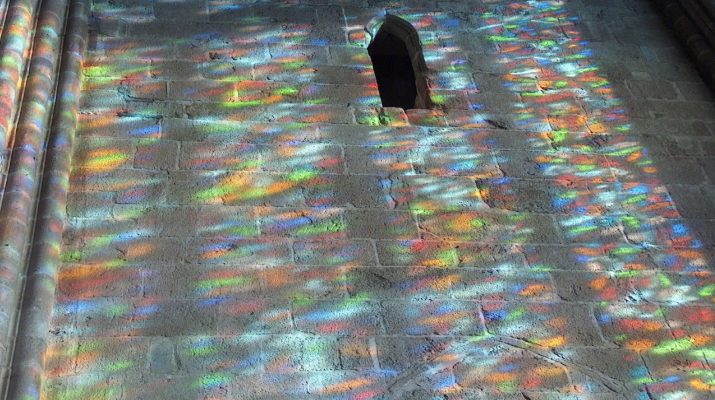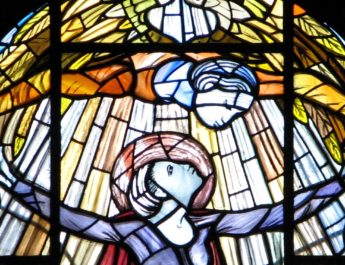Romans 8:22-27
Pentecost B26
22 We knowA that the whole creationB has been groaningC in labor painsD until now;
A “know” = eido. This is to know, consider perceive, appreciate, behold, or remember. It means seeing with one’s eyes, but also figuratively, it means perceiving – seeing that becomes understanding. So, by implication, this means knowing or being aware.
B “creation” = ktisis. 19x in NT. From ktizo (to build, create, form, shape; God’s acts of creation); probably akin to ktaomai (to get, purchase, possess). This is creation, creature, or ordinance. It is also used for when a city is founded and creation as origin.
C “groaning” = sustenazo. 1x in NT. From sun (with, together with) + stenazo (to groan inwardly, sigh, complain; groaning from the pressure of forward momentum as in childbirth); {from steno (to moan, groan, sigh) OR stenos (narrow, constricted, compressed; hemmed in from obstacles); probably from histemi (to stand, place, set up, establish, stand ready, stand firm, be steadfast)}. This is to moan or groan together – to lament. Figuratively, it is sharing in a tragedy.
D “labor pains” = sunodino. 1x in NT. From sun (with, together with) + odino (to have labor pains, be in labor; it is having labor pains from a literal or figurative sense); {from odin (labor pain, intense agony, sorrow, the pain of a new endeavor); akin to odune (pain, distress, grief – physical or mental; anguish); from duno (to enter, sink into; can also be set like the sun)}. This is to suffer together as labor pains.
23 and not only the creation, but we ourselves, who have the first fruitsE of the Spirit,F groanG inwardly while we waitH for adoption,I the redemptionJ of our bodies.K
E “first fruits” = aparche. 8x in NT. From apo (from, away from) + arche (origin, beginning, rule; can refer to the power of a magistrate or a king; it is the first thing as being the starting point or the most important); {from archomai (to begin or rule); from archo (to rule, begin, have first rank or have political power)}. This is first fruit or gift. It is the beginning of sacrifice – so the first crops of the season. It is also used figuratively of early converts in a specific location.
F “Spirit” = Pneuma. From pneo (to blow, breath, breathe hard). This is wind, breath, or ghost. A breeze or a blast or air, a breath. Figuratively used for a spirit, the human soul or part of us that is rational. It is also used supernaturally for angels, demons, God, and the Holy Spirit. This is where pneumonia comes from.
G “groan” = stenazo. Related to “groaning” in v22. 6x in NT. See note C above.
H “wait” = apekdechomai. 8x in NT. From apo (from, away from) + ekdechomai (to take or receive, expect, await; to welcome someone from your heart; focusing on the goal of waiting or the outcome); {from ek (from, from out of) + dechomai (to warmly receive, be ready for what is offered, take, accept, or welcome; to receive in a literal or figurative sense)}. This is eager awaiting or fully expecting something.
I “adoption” = huiothesia. 5x in NT. From huios (son, descendant; a son whether natural born or adopted; also used figuratively for other forms of kinship) + tithemi (to put, place, set, fix, establish in a literal or figurative sense; properly, this is placing something in a passive or horizontal position). This is making a son, adoption.
J “redemption” = apolutrosis. 10x in NT. From apo (from, away from) + lutroo (to redeem, liberate, release because ransom was paid in full; figuratively, returning something or someone to their rightful owner) [from lutron (ransom, the money used to free slaves; also a sacrifice of expiation; figurative for atonement); from luo (to loose, release, untie; figuratively, to break, destroy, or annul; releasing what had been withheld)]. This is redemption, deliverance, or release particularly with the notion of ransom paid – a buying back what had been lost.
K “bodies” = soma. Here, singular. Perhaps from sozo (to save, heal, rescue); from sos (safe, well, rescued). This is body or flesh. It can be body in a literal or figurative sense (as the body of Christ). This is where the word “somatic” comes from.
24 For in hopeL we were saved.M Now hope that is seenN is not hope. For who hopes forO what is seen? 25 But if we hope for what we do not see, we wait for it with patience.P
L “hope” = elpis. From elpo (to anticipate, welcome, expect; usually to anticipate positively). This is expectation, hope, trust, confidence faith. The expectation can be abstract or concrete.
M “saved” = sozo. Perhaps related to “bodies” in v23. See note K above.
N “seen” = blepo. This is literally to see – it is primarily used in the physical sense. However, figuratively it can be seeing, which includes attention and so to watchfulness, being observant, perceiving, and acting on the visual information. It can also mean beware.
O “hopes for” = elpizo. Related to “hope” in v20. From elpis (see note L above). This is to expect, trust, hope for, or to wait in an active way.
P “patience” = hupomone. From hupo (by, under, about) + meno (to stay, remain, wait, await, continue, abide). This is properly to remain behind or remain under. It implies endurance, patience, steadfastness, and waiting in hope.
26 Likewise the Spirit helpsQ us in our weakness;R for we do not know how to prayS as we ought,T
Q “helps” = sunantilambanomai. 2x in NT– here and in the incident with Mary and Martha and Jesus where Martha asks Jesus to tell Mary to help her in Luke 11:40. From sun (with, together with) + antilambano (to take instead of, take hold of, help, support, enjoy; providing or receiving support that directly corresponds to the real need); {from anti (over against, opposite instead of, offsetting) + lambano (to take, receive, get, lay hold of; to lay hold by aggressively or actively accepting what is available or offered; to accept with initiative; emphasizes the volition of the receiver)}. This word is to take hold with at the side, lend a hand along with, cooperate with, take one’s share in, help, aid. Give assistance with full initiative because closely identified. Supplying help that exactly corresponds to the need. Personal interest motivating giving the help.
R “weakness” = astheneia. From asthenes (without strength, sick, deprivation; weak in a moral or physical sense); {From a (not) + sthenes (strong, vigor); {from the base of sthenoo (to strengthen so that one can be mobile); from sthenos (strength)}}. This is weakness, frailty, illness, suffering, or calamity. It is any kind of sickness or injury that includes weakness or diminishes your ability to enjoy or accomplish what you would choose.
S “pray” = proseuchomai. From pros (advantageous for, at, toward) + euchomai (to wish, make a request, pray). This is to pray or pray for, to worship or supplicate. It is more literally exchanging one’s own wishes for God’s.
T “ought” = dei. From deo (to tie, bind, compel; declare unlawful). This is what is necessary or proper. It is what is needed or what one should do – a duty or something inevitable. This refers to something absolutely necessary.
but that very Spirit intercedesU with sighsV too deep for words.W
U “intercedes” = huperentugchano. 1x in NT. From huper (by, under, over, above, under the authority of another) + entugchano (to encounter, appeal, please, chance upon, confer with, to meet someone in order to consult with them); {from en (in, on, at, by, with, among) + tugchano (root means to become ready; to hit, meet, happen, obtain, chance, perhaps; properly, to hit the mark or be spot on; the opposite of the Greek word for sin hamartano, which literally means to miss the mark); {perhaps from tucho (to make ready, bring about)}}. Properly, to happen upon someone – to bend forward in order to make petition for or intercede – to grant benefit.
V “sighs” = stenagmos. Related to “groaning” in v22 & “groan” in v23. 2x in NT. From stenazo (see note C above). This is groaning or sighing, particularly because of a situation that is bringing a lot of pressure.
W “too deep for words” = alaletos. 1x in NT. From a (not, without) + laleo (to talk, say, preach); {from lalos (talkative)}}. This is inexpressible, unspeakable. It is something “that baffles words” or is too profound to be expressed.
27 And God, who searchesX the heart,Y knows what is the mindZ of the Spirit, because the Spirit intercedesAA for the saintsBB according to the will of God.CC
X “searches” = ereunao. 6x in NT. From eraunao (to search or examine); perhaps from ereo (to say, tell, speak, mean, command); perhaps from rheo (to say, speak of, command). This is to seek or examine. Figuratively, it can mean to investigate or desire to know.
Y “heart” = kardia. Literally the heart, but figuratively mind, character, inner self, will, intention, thoughts, feelings. Also, the center of something. The word heart is only used figuratively in the Old and New Testaments. This is where “cardiac” comes from.
Z “mind” = phronema. 4x in NT. From phroneo (to think, judge, use one’s mind, have an opinion, shape one’s opinion through action); from phren (diaphragm, heart, intellect, understanding; figurative for personal opinion or inner mindset; thought regulating action; sympathy, feelings, cognition); perhaps from phrao (to rein in or curb). This is thought, purpose, mindset, inner perspective. It can also mean acting on gut insight.
AA “intercedes” = entugchano. Related to “intercedes” in v26. 5x in NT. See note U above.
BB “saints” = hagios. From hagnos (holy, sacred, pure ethically, ritually, or ceremonially; prepared for worship, chaste, unadulterated, pure to the core; undefiled by sin; figurative for innocent, modest, perfect). God is totally different from humanity and thus set apart. That which is consecrated to worship God (elements of worship) or to serve God (as the saints) are holy because they are now set apart for God’s purposes. Holy because important to God. This is sacred physically, pure. It can be morally blameless or ceremonially consecrated.
CC “God” = Theos. From Proto-Indo-European origins, meaning do, put, place. This is God or a god in general.
Image credit: “Stained Glass in Treguier” by fdecomite, 2007.




